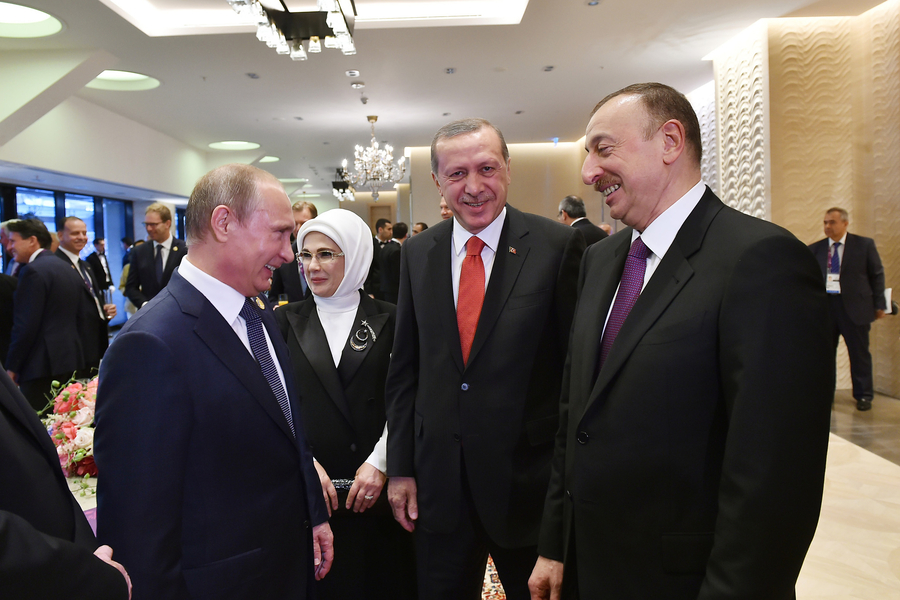
While Turkish President Recep Tayyip Erdoğan has been cracking down heavily on dissent, shutting down media outlets and arresting or imposing travel bans on scores of critical journalists, activists, and academics, a bit further to the east, a lesser-known autocrat has been busy doing much the same. Azerbaijani President Ilham Aliyev – who has been described as being in a “bromance” with Erdoğan – has overseen a smaller-scale but similarly brutal crackdown, working aggressively to silence critics in the run-up to a controversial constitutional referendum that takes place today.
Known mostly to the west for its rich energy resources and for hosting mega events like the Eurovision Song Contest, Olympic spin-off the European Games, and the Formula One European Grand Prix, Azerbaijan has been ruled by Ilham Aliyev since he took over from his father Heydar Aliyev upon his death in 2003, and has not held a single fair and free election ever since. Monday’s vote will almost certainly result in the adoption of a series of problematic amendments that will lead to Erdoğan-style consolidation of power in Aliyev’s already-dominant presidency, an extended presidential term of seven years, and a lowered minimum age requirement to run for president, among other measures.
The referendum itself was set just days after the 15 July coup attempt in Turkey, and the Turkish influence did not stop there. On 15 August, the Azerbaijani Prosecutor General’s Office launched a criminal investigation into alleged Gülen supporters “to prevent illegal actions on the territory of Azerbaijan”. Authorities used the Gülen pretext in a number of cases of arrests of journalists and activists, such as NIDA civic movement activist Elgiz Gahraman, detained since 18 August on charges of drug possession and forced to sign statements about an alleged relationship with Fethullah Gülen, and opposition Azadliq newspaper financial director Faiq Amirov, detained since 20 August on charges of inciting religious hatred. Local rights groups report there are now more than 100 cases of political prisoners in Azerbaijan, with numbers steadily increasing.
A newspaper connected to the Gülen movement, Zaman Azerbaijan, announced that it was closing on 20 July, expressing support for “Azerbaijan’s statehood”. Privately-owned Azerbaijani television station ANS TV has been off the air since 29 July, when authorities revoked the station’s license in connection with its planned broadcast of an interview with Fethullah Gülen. Broadcasts of critical Internet-based media has also been interrupted. Azerbaycan Saatı (“Azerbaijan Hour”), ceased transmission on 27 July when Turkish Barış TV was among the media outlets shut down by Erdoğan’s presidential decree in Turkey, alleging ties to Gülen. Radio Free Europe/Radio Liberty’s programme Azadlıq (“Freedom”) A-LIVE, was also stopped by Türksat satellite on 8 August, with no explanation.
Scores of academics have been fired from their jobs at schools and universities in
Azerbaijan on the basis of alleged ties to the Gülen movement. In August, Baku’s Caucasus University was shut down before being brought under the control of Azerbaijan’s state oil company. Fifty Turkish instructors from the university were fired and deported. A network of schools associated with Gülen – 11 high schools, 13 university exam preparation centres, and one private university – were similarly shut down and then transferred to the control of the state oil company in 2014, following a visit by Erdoğan to Baku.
This recently renewed wave of the human rights crackdown in Azerbaijan is only the latest example of mutually supported repression in the two countries. While Turkey was once seen as somewhat of a safe haven for critical Azerbaijani journalists and activists, that is no longer the case. In 2014, the Turkish government deported Azerbaijani journalist Rauf Mirkadirov, handing him over to the Aliyev regime, which promptly jailed him on politically motivated charges of high treason, accusing him of spying for Armenia, and later sentencing him to six years of imprisonment. He served 18 months of the sentence before a Baku court released him on probation. Mirkadirov’s extradition was believed to be part of a deal struck during Erdoğan’s visit to Baku just days earlier.
If imitation is the most sincere form of flattery, Erdoğan should be feeling very flattered indeed by Aliyev’s behaviour, and the international community should be growing increasingly concerned. As Erdoğan and Aliyev become more emboldened in disregarding their international human rights obligations – Turkey and Azerbaijan are ranked towards the bottom of Reporters Without Borders’ Press Freedom Index, at 151st and 163rd of 178 countries, for example – it is the people of Turkey and Azerbaijan who will continue to pay the price. The international community must take concrete action now to hold the governments of Turkey and Azerbaijan accountable and secure the release of the hundreds of critics currently jailed for political reasons in both countries.